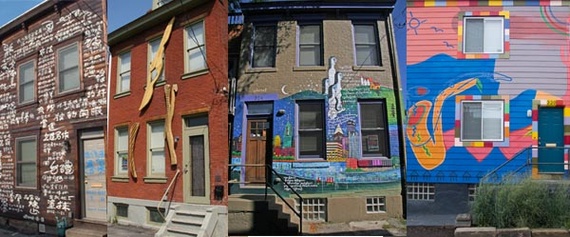Wednesday
A few weeks ago I stumbled across an article about how the arts, including literature, are resurrecting decaying cities. It makes sense to me but it came as a surprise to The Atlantic’s James Fallows, who spent three years with his wife visiting and revisiting cities with interesting stories:
I am a philistine, who has not really cared about the state of the arts. Give me research centers and “makerspaces” with 3‑D printers, plus a factory or two, and I’ll tell you how I feel about a town. Perhaps the topic on which I’ve most changed my mind through our travels concerns the civic importance of local arts, and the energy being devoted to them across the country.
Pittsburg has seen one of the most impressive comebacks, and writers have played a role in that. Here’s Fallows’s account:
The arts initiative that struck us in Pittsburgh was bottom-up and frugally operated, rather than a big foundation project. It is known as the City of Asylum project, and its goal is to revive a run-down area of Pittsburgh and make it a haven for persecuted writers from the rest of the world. In the 1990s Henry Reese, the founder of local telemarketing and coupon-book firms, and his wife, an artist named Diane Samuels, became interested in the cause of oppressed novelists, poets, and journalists. By 2004, they had organized and opened the only independently funded U.S. branch of the City of Asylum movement, which was already strong in Europe. (There are two other such cities in the United States, but they are run by universities; Pittsburgh’s is on its own.) They put up some of their own money, and ran fund-raisers and recruited donors for more, so they could buy a series of rowhouses in the once-seedy Mexican War Streets district of Pittsburgh (the streets are named for battles and generals from that war) for their writers and artists to stay for periods of months or years.
One of the first was a long-imprisoned dissident poet from China. He decided to turn his house into public art, covering it with poems in large Chinese characters. A Burmese writer and her family came, and painted the exterior of their house with landscapes and “dreamscapes.” Strolling down the streets is like being in a graffiti-covered part of town, but one where the style, palette, and theme vary building by building, and the decorations have been done carefully and proudly rather than on the fly. The program has steadily expanded, still locally funded; in the past decade more than 250 poets, writers, musicians, and artists from around the world have put on public performances in Pittsburgh. They have, through the arts, enhanced the city’s international reputation and, more important, given it an expanded conception of itself. Plus, the Mexican War Streets district has become a tourist draw.
Fallows concludes his article with a prediction that the arts will pull us out of our national malaise, just as the country emerged successfully from an era of gross inequality over a century ago:
When the national mood after the first Gilded Age favored reform, possibilities that had been tested, refined, and made to work in various “laboratories of democracy” were at hand. After our current Gilded Age, the national mood will change again. When it does, a new set of ideas and plans will be at hand. We’ve seen them being tested in places we never would have suspected, by people who would never join forces in the national capital. But their projects, the progress they have made, and their goals are more congruent than even they would ever imagine. Until the country’s mood does change, the people who have been reweaving the national fabric will be more effective if they realize how many other people are working toward the same end.
Here’s empirical evidence that literature and the other arts, intangible though they are, have what people desperately need.


